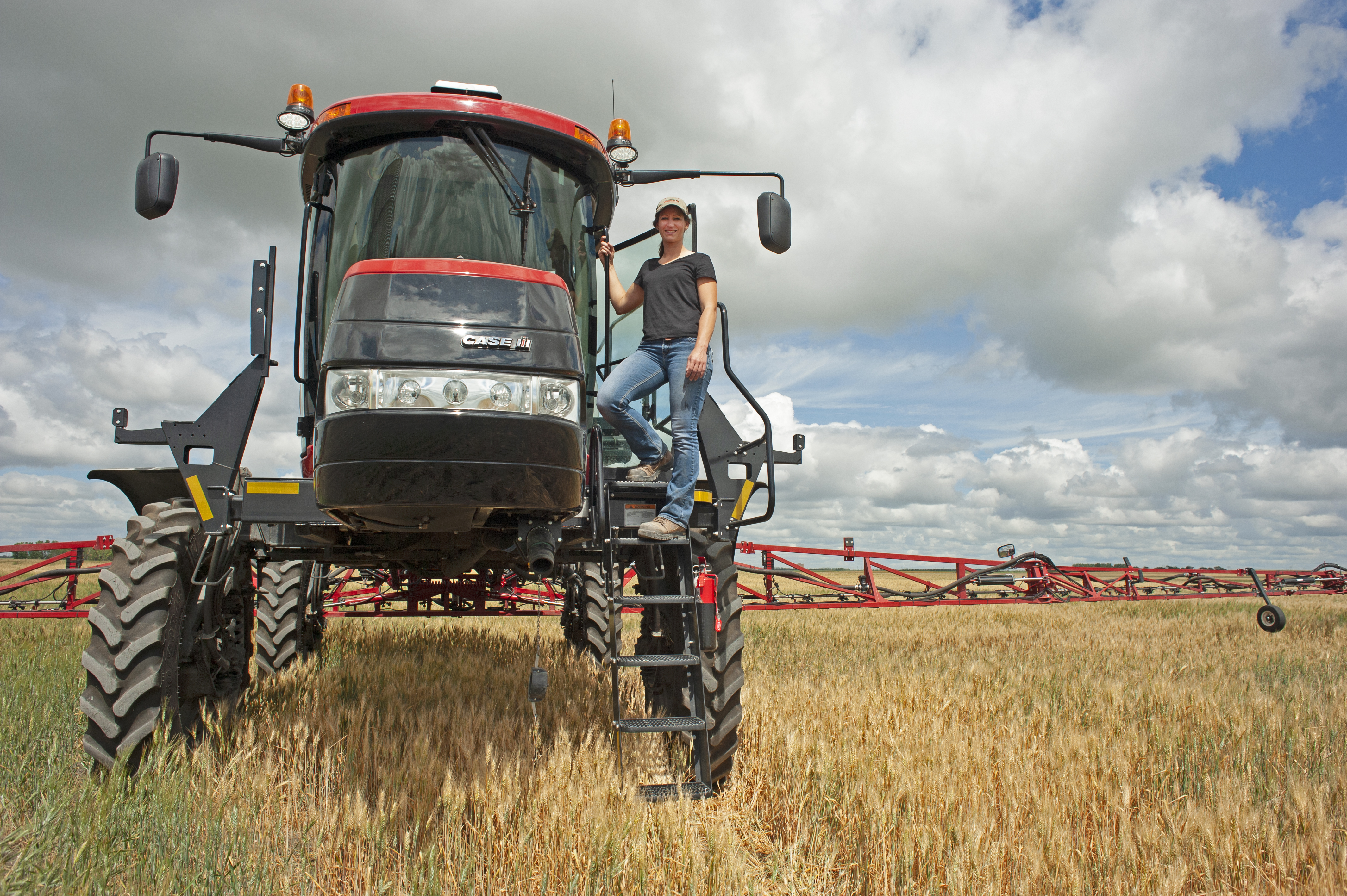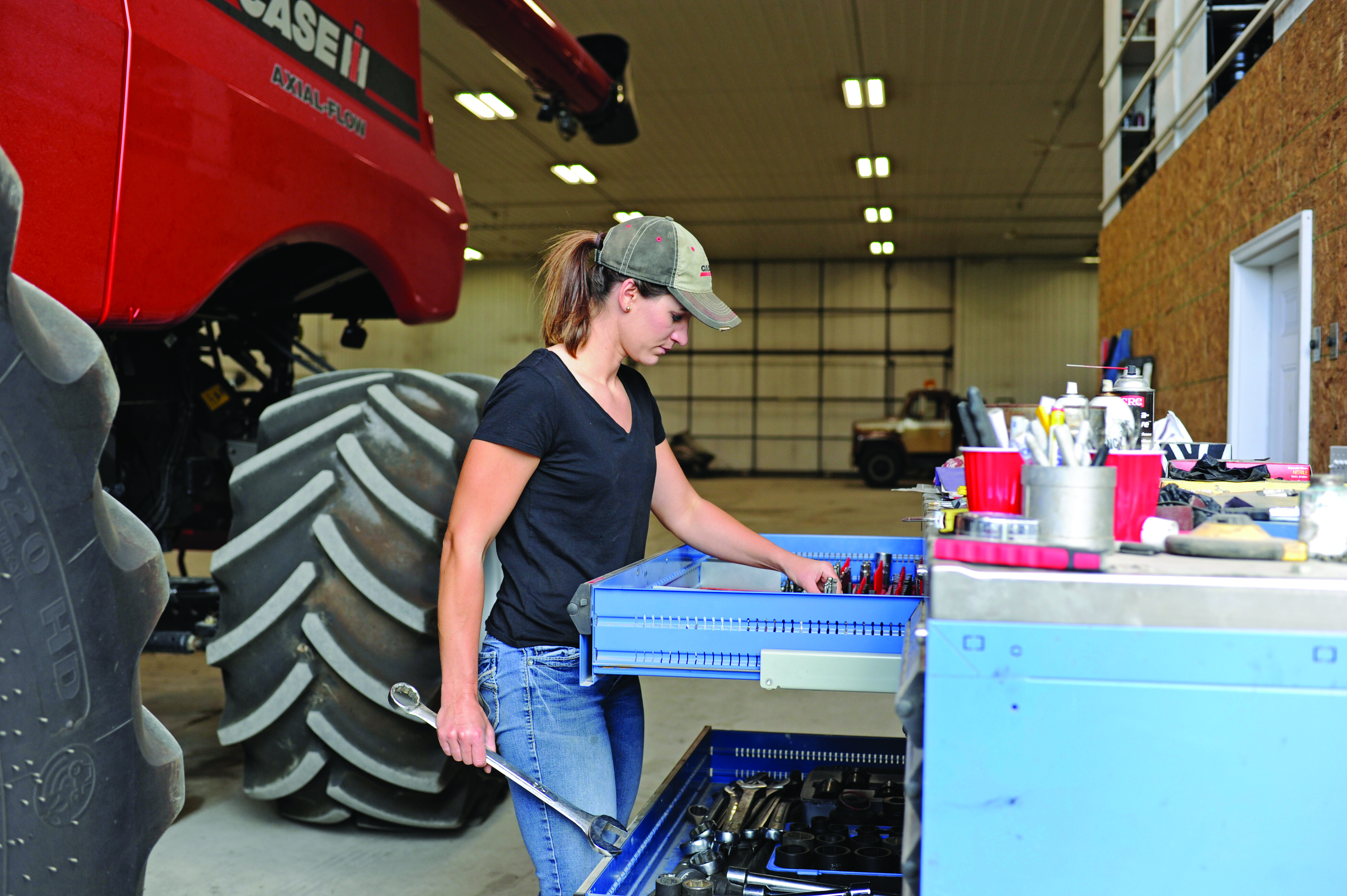Agents of change
In Saskatchewan, women have always played a vital role in farming. For some immigrant women, this meant pulling the plow alongside their husbands and children. For others, it meant a secondary role tending gardens, raising animals, cooking and feeding the male field workers and threshing crews.
By DEE HOBSBAWN-SMITHHowever, the past is just that: the past. Today looks a lot different from the days of hand plows and horse-drawn machinery. Women are stepping up, seeing greater presence in agriculture’s business boardrooms and fields.
According to the World Bank, women make up almost half of the world’s farmers. Those numbers vary in the western world. On Saskatchewan farms, the number of women working solo on farms rose marginally between 2011 and 2016, from 1,385 to 1,965. As of 2016, 11,275 women farmed provincially. But, as several USask alumni have proven, the extended world of agriculture and bioresources is vaster than the farms of the prairies.
Susan Blair (BSA’88) currently works in southern Ontario in the field of animal health pharmaceuticals. As Boehringer Ingelheim’s executive director of animal health, she leads a team that brings preventative and specialty therapeutic pharmaceutical products for livestock and companion animals to market.
“I landed in a very different part of life and in a different part of the country than I would have planned,” she commented wryly. “I spend my workdays thinking about three things: the industry itself—the Canadian animal health business; people, both customers and the internal talent we are building; and strategy—where we are going and how we will get there.”
Raised on her family’s grain and cattle farm near Lanigan, Sask., Blair recalls writing a paper for school in Grade 4 detailing how she was going to get a degree and farm, just like her father and grandfather. But she also recalls her father telling her unequivocally, “You can’t just farm, you need an education first. No one can take that from you in tough times.”
His words proved prophetic. Blair, who went on to earn both her degree and buy land near the family holdings, lost her land in the economic downturn of the late 1980s, when high land prices and interest rates combined with drought and global trade wars drove commodity prices through the floor. Blair moved laterally into pharmaceutical sales with Pfizer, hoping to eventually return to farming. She never did. Instead, curious and ambitious, she shifted her focus from livestock to companion animals, and took on marketing, leadership and global assignments.
She parlayed her farm background into a corporate leadership role that eventually landed her with Boehringer Ingelheim, a global, research-driven pharmaceutical company. In doing so, Blair received a lot of support but initially her mentors were mostly male. In her turn, Blair has grown into a role as a respected champion of women, notably speaking in 2015 at the annual Advancing Women in Agriculture conference.
Blair’s gratitude for her wide-ranging cultural and business experiences has accrued interest.
“I would not be where I am now without that diversified background,” she said, laughing. “It’s a complicated life,” she conceded. “You need to be agile, accountable, adaptive, entrepreneurial, a risk-taker. I aspire to making a positive difference to my people and to the animal health industry.”
By all standards, she has achieved just that.
Fran Walley (PhD’93) serves as USask's College of Agriculture and Bioresources associate dean (academic). Deeply involved in farm-related research, like current AgBio dean Mary Buhr, Walley’s field is literally the ground that farming is built on: soil science.
“I’ve always been interested in biology,” she explained. “Agriculture is in many ways applied biology. That aspect of applied science fascinates me. I’d love to farm, but it’s not my path.” As a scholar, she has investigated what teems underground—the life in soil—that forms the bedrock of agriculture. But she also has a pulse on the lives of women who enter the field.
“Agriculture continues to evolve and programs within the College of Agriculture and Bioresources have also evolved from a single undergraduate Bachelor of Science in Agriculture,” she said.
“Nowadays, along with the many majors (within the BSA), we also offer Bachelor of Science degrees in renewable resource management, agribusiness and animal bioscience. All of our programs, including the BSA, attract a lot of women. More than 50 per cent of our undergrads are female. In addition to training future farmers, we train scientists and agronomists, researchers, people who go into sales, consulting, environmental consulting, finance, government and academia. The diversity of jobs and careers reflects just how closely our provincial economy is tied to agriculture. This college touches the entire world.”
Walley admits that even as societal customs toward child-rearing evolve, women who carry the weight professionally often still have to balance their home lives and careers. “The same issues face any woman balancing family and professional lives, and there can be
extra challenges in terms of progressing professionally.”
Women are pursuing careers in all aspects of agriculture and contribute meaningfully, she said. “Farming is a very complex business, with many complex considerations—science, agronomy, marketing, food processing for value added. To capture that diversity, education provides a really solid background.”
Finding those skilled farmers, male or female, is part of the role played by Debra Hauer (BSA’79), currently manager of Agri LMI (Labour Market Information) in Ottawa. In her youth, Hauer was actively involved on the family farm near Lloydminster, Sask. She earned her masters in education in 2008 in Ottawa, and taught agriculture courses at the college level in Regina, where she served as executive director of the Saskatchewan 4-H Council before serving with an Indigenous women’s organization in the North.
In her current role, Hauer returned to her farming education background. She describes her job as finding and identifying people in agriculture, having the right number of people with the right skills, encouraging family businesses, ensuring that there are sufficient well-trained people in the agricultural workforce. To clarify the difficulty, she suggests thinking about children age five to 14 who will be taking over farms in the coming decades. “There are not a lot of kids in rural areas,” she said. “Where will [farm] people come from in the future?”
Hauer was never tempted to farm herself.
“At the time when I might have, there was a lot of consolidation, changes that resulted in fewer, but bigger, farms. My roots are in farming, though, and I enjoy working in a farm-related industry,” she said.
For women looking to make their names on the corporate side of agriculture, she has some succinct advice. “Women need to grab the opportunities. Find an individual or a group to serve as your personal board of directors. You need a champion to advocate for you if you aspire to a board position.”

Katelyn Duncan (BSA’14) bears witness to this need for supportive mentors in farming.
“At age 12, I knew I wanted to be a farmer,” Katelyn recounted. “I told my uncle. He said ‘Awesome! You will do well.’ That’s the best kind of support you can get from an older farmer.”
She and her sister, Mary Jane Duncan-Eger (BSA’13), manage the family farm south of Regina, where the women and their brother were raised. Duncan-Eger and her husband live and work on their own farm near Coronach, two hours from Regina, but she also puts in long hours on the family farm with Duncan, their brother and father.
The path to putting “family” on the farm has not been easy. Duncan’s sister had originally planned on a medical career, but changed course and studied agricultural economics. As well, the almost-inevitable conflict arose.
“Dad wasn’t ready to let go when I wanted more responsibility, and I thought I knew it all after I finished university,” Duncan said.
As a result, Duncan worked on other farms and as an agronomist in Saskatoon for several years. At age 25, sitting in a National Young Farmers conference in Ottawa, Duncan had an “Aha!” moment of clarity: she needed to quit, go travelling for the winter, and then
move closer to the farm. “All I ever wanted to do was farm,” she said simply. That winter, she used her network to land a job running a combine during harvest in Australia.
“First this guy offered me a job in the kitchen [by long-distance phonecall],” she said. “The next day, when he realized I had real experience, he asked if I’d be comfy with the boys in camper vans for two months. I told him I didn’t expect any special arrangements, but I did expect a respectful work environment. My tone convinced him, that and my unwillingness to settle for the kitchen job. I ended up being the first girl he ever hired to drive combine.”
After Australia came a month in Zambia, where Duncan worked long hours on an 18-hectare farm owned by an orphanage. “It was humbling, on top of experiencing culture shock,” she said. “Here, maybe 12 per cent of people work in farming and related fields, so
the North American disconnect from agriculture is staggering. In Africa, over 60 per cent of people work in food production. And it was all manual labour. We fertilized maize, dug mounds of dirt for sweet potatoes, worked with pigs and mucked out their stalls.”
While in Zambia, Duncan made time to visit Ndola University’s farm to investigate banana research and make a presentation on agriculture in Canada. She came home inspired.
“Farmers in Africa are passionate about the soil and what they do,” she said. “The work ethic is incredible. I am a different person because of it.”
As a young alumna, Duncan has already racked up some impressive credentials. During her final year of her BSA, she completed her Agriculture Technician Certificate through Sask Polytechnic. She worked as general manager of SK Ag Young Entrepreneurs, an organization that provides networking and training to young farmers. She currently serves as a director for the Canadian Young Farmer Forum and the local Conservation and Development Association. After a government job in Regina, working with farmers to rebuild trust in modern agriculture and later, in agriculture policy, Duncan and her family arrived at a compromise.
“In university, I was full of pith and vinegar,” she admitted. But the situation has changed since: the women’s father has started to pass the torch. “We are partners, with different strengths and weaknesses,” Duncan said proudly. “My sister is stronger at finance
and marketing, and I am stronger on operations and equipment. Succession plans are something every farm has to deal with. We have to make compromises to be happy and to keep the people in our lives happy.”

At 18, Duncan wanted to be a landowner and full-time farmer by age 23. At 28, she is a full-time farmer and partway through a master’s degree in policy “to give me a better big-picture understanding of our industry.” More importantly, she has grown up. She realized that other experiences could help her before she committed to being a business owner. Along the way, she tapped the shoulders of other farmers and previous bosses—mostly men, all older.
“Those men are the farmers right now, and they are my tribe. But the difference between baby boomer farmers and the young farmers of today is that the new farmers want a life outside of the farm. We chase this thing called work-life balance, and try to leave room in our lives for off-farm priorities, whether that’s family, kids or sitting on boards. There’s not just one definition of farmer. You have to find the one that makes you happy.”
Speaking for her cohort, Duncan was asked, “When is the next generation ready to take over?” Her answer: “When they show up with a long-term vision for the farm. When they show leadership and are conscientious and take the initiative. When you are willing to trust them.”
Photos by Mark Taylor


